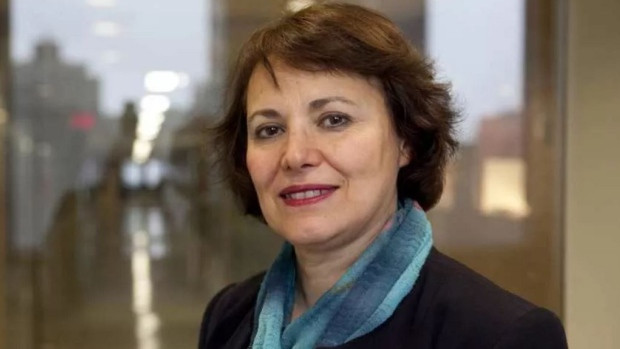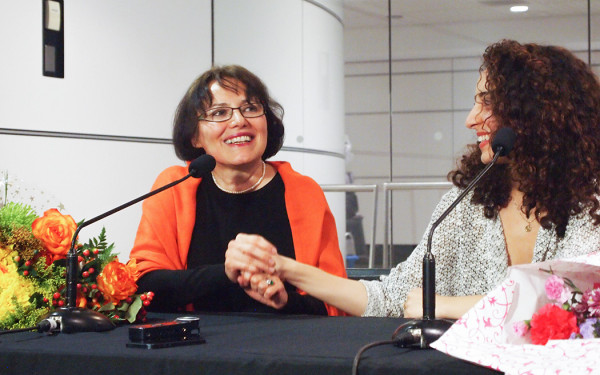Homa Hoodfar Hospitalized in Iran
After Three Months Solitary Confinement Former Concordia Professor’s Health Significantly Deteriorated
Homa Hoodfar had been in solitary confinement in Tehran, Iran’s Evin prison for over three months before word got out on Tuesday, Aug. 30 that she had been hospitalized due to her rare neurological condition, called Myasthenia Gravis.
The former Concordia professor is now back in solitary confinement, and members of the campaign to free Hoodfar are urging the academic community to take action more than ever.
The campaign, which can be found at homahoodfar.org, went public in early June, after Hoodfar was imprisoned for unknown reasons on June 6. A ticking clock at the top of the initiative’s web page shows the precise number of seconds that Hoodfar has been imprisoned.
Hoodfar had travelled to Iran in February to visit family and conduct academic research. Members of the Counter Intelligence Unit of the Iranian Revolutionary Guard raided her apartment in early March. The Revolutionary Guard is a branch of the Iranian Armed Forces put in place to protect the country’s Islamic system.
All of Hoodfar’s possessions were confiscated—including her passport, computer, and research documents. What followed were a series of long interrogations, during which Hoodfar was denied the accompaniment of her lawyer.
On June 24, 18 days after her initial imprisonment, the Tehran Public Prosecutor finally announced that Hoodfar was being investigated for “dabbling in feminism and security matters,” according to the campaign’s website. Hoodfar’s family was restricted contact with her while she was imprisoned.
According to Hoodfar’s niece Amanda Ghahremani—a key campaigner for her release from Canada—she was charged with propaganda against the state and for collaborating with hostile governments against the state.
“We don’t know what exactly is the evidence that they have to claim that she’s done any of this,” Ghahremani said. “Is it her academic work? What is it? That’s what’s unclear to us.”
Hoodfar’s academic work does not lend itself to these types of charges, she added.
“If anything, she’s been quite an ambassador of Muslim women and their agency and their ability to confront, here in the West, racism, Islamophobia, all these things. So it’s very confusing.”
Hoodfar’s colleagues and students agree that her work is quite balanced. Her colleague and friend Marc Lafrance, an associate professor who has worked alongside Hoodfar in Concordia’s Sociology and Anthropology Department who is an active member of the Free Homa campaign, called this situation a “heinous injustice, because she is one of the most balanced, even-handed and tireless [sic] scholars.”
Ghahremani believes that the targeting of Hoodfar is related to a wider crackdown on women who work on women’s issues in Iran.
“[Hoodfar] seems to be caught in the crossfire of this domestic struggle between hardliners and religious conservatives and the administration and women, who […] have domestically in Iran been working on improving their own rights without any outside interference.”
Concordia’s Lack of Mobilization
Through the campaign, individuals and organizations worldwide have shown their support by signing petitions, writing open letters and submitting statements of solidarity. Over 5,000 academics, including Noam Chomsky and multiple Nobel laureates, have signed the academic petition. However, a second petition, which was initially made specifically for Hoodfar’s students and has since expanded to include any student who is outraged by this situation, has only garnered 193 signatures since its inception on July 18.
Pamela Fillion, one of the graduate students Hoodfar was supervising, despite her retirement from Concordia in 2015, and someone who helped draft the student petition, said there could be various reasons for the small number of signatures.
First, the petition has not been circulated by Concordia administration to students, despite requests made by Ghahremani to the university to utilize its vast networks and list-serve of alumni, students and academic contacts.
“I don’t know the rationale behind it, but these are the small ways in which a university of this calibre with these resources would be able to really mobilize individuals and help spread the word,” Ghahremani said.
Fillion also mentioned another possible factor in the low number of students on the petition is that Hoodfar was slowly phasing out of her work with the university and thus was not teaching undergraduate students, who make up the majority of Concordia’s student population.
Upon the news of Hoodfar’s imprisonment on June 9, Concordia President Alan Shepard released a statement of solidarity on the university’s website. The message stated great concern for Hoodfar, and expressed faith that Global Affairs Canada has been using diplomatic channels to address the situation.
“We’re living and breathing this campaign, and we’re doing everything we possibly can to release her.” – Marc Lafrance
On Aug. 30, Shepard released another statement—again without linking it to the campaign—stating extreme concern for Hoodfar’s health, the importance of academic freedom, and support for “all efforts underway to secure Dr. Hoodfar’s return to Canada” and to “renew our call for the immediate release of our colleague.”
“We have been in communication with representatives of Global Affairs Canada throughout. We are prepared to offer whatever support they request of us,” said Concordia University spokesperson Chris Mota in an email on Sept. 1, adding that the number of students on the petition will “probably rise now that they will be returning to campus.”
Ghahremani said she thinks the university has an obligation to stand behind Hoodfar, and support the campaign to free her, in any way they can. She suggested Concordia use its influence as a safe space for academic freedom to stand in partnership with Iranian academic institutions.
The question now is what will it take to bring Homa home? Ghahremani said there generally needs to be a diplomatic push. Canada does not have any diplomatic relations with Iran, and has not had an embassy in Tehran since September 2012. Hoodfar is also an Irish citizen, and there is an Iranian embassy in Dublin.
“What I’d really like to see is for [the government of Ireland] to really show that Homa is a priority to them as a nation,” Ghahremani said.
John Babcock, a representative of Global Affairs Canada, said in an email that the department’s members are “engaged on this case and doing everything we can to support Amanda Ghahremani and the family as they endure this terrible ordeal. Minister [Stéphane] Dion and our parliamentary secretary have both met Amanda, and consular officials remain in close and regular contact with her.”
He added that in the absence of diplomatic relations between Canada and Iran, Global Affairs is working with “countries of influence” in order to find the best way to secure Hoodfar’s safe return.
“The challenges posed by the absence of a diplomatic presence cannot be underestimated,” Babcock added.
According to Lafrance, a family member was able to see Hoodfar while she was hospitalized. This person was extremely disturbed by Hoodfar’s disoriented and weak state, and said she had trouble walking and talking.
“We’ve basically been devoting our entire lives to this for months now,” Lafrance added. “I’m extremely, extremely concerned.”
He added that this situation has taken a serious psychological toll on everyone involved in the campaign.
“We’re living and breathing this campaign, and we’re doing everything we possibly can to release her.”
While Hoodfar’s hospitalization marks a serious change and increased concern from everyone involved, Ghahremani remains as positive and motivated as possible.
“The only thing that we have right now is hope,” she said. “Really what keeps me going is who Homa is.”
She added that Hoodfar is extremely generous, a sentiment that resonated with both Fillion and Lafrance.
“Not having her here is this void that is incredibly palpable,” Ghahremani said. “I’m going to do everything I can to make sure she comes back and I can hold her again and see her. We have no choice.”
There are two upcoming demonstrations in support of Hoodfar, one of which will take place on Sept. 28 at 12:15 p.m. in CEGEP Édouard Montpetit’s student cafe. Marie-Eve Drouin Gagné, a graduate student at Concordia, will be giving a talk on Hoodfar’s work as it relates to gender issues and veiling. The campaign hopes that other CEGEPs will get involved through similar events.
An earlier version of this article quoted Amanda Ghahremani saying Homa Hoodfar was an ambassador for Muslim women in the West who confronted homophobia. Ghahremani did not say homophobia, but instead Islamphobia. The Link regrets the error.





1web_600_375_90_s_c1.jpg)
web_600_375_90_s_c1.jpg)
